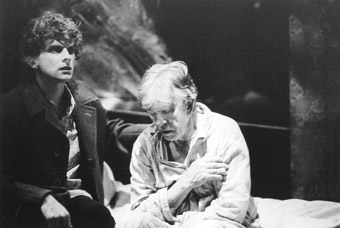Closed circuit
Keith Gallasch

Leon Ford, Martin Vaughan, presence
photo Robert McFarlane
Leon Ford, Martin Vaughan, presence
Two young people on the street, alone, separate, voices in the night. He (Leon Ford) has a secret. When he was child he killed his father. Did we hear this? We’re not sure, especially when nothing more is made of it in the first act. An urban boarding house. A sad landlady (Lynette Curran) addresses someone who seems not to be there. An old man (Martin Vaughan) is forced to share his room with a newly arrived country boy (Damon Herriman). The boy introduces himself to the reticent old man with the probing speed and bite of the baddies in Pinter’s Birthday Party. The young man on the street stalks the young woman (Rita Kalnejais). They meet. He exudes a quiet malevolence, equating himself with “a reptile, sunning itself.” She wanders because she fears sleep paralysis. She is searching for her demons, “to kill them.” The old man conveys to the country boy his hopeless dream of youthful independence as embodied in his Ford Mercury, his loneliness in his mysogyny—of the landlady he says, “she sucked my life out.” The ‘ghost’ she addresses is her dead husband, the father of the young man we first saw on the street. The country boy meets the young woman in the park, they fuck, he loses his wallet, she finds it, gives it to the old man who removes the money in order to educate the country boy in the evils of womanhood. By now I feel like I’m watching a Daniel Keene play with a plot. And the plot is not very good and gets creakier in Act Two.
However, I’m enjoying van der Werf’s way with language, a grim poeticising spiced with blunt wit, and also the manner in which he builds his night cosmos so that we must work a little at putting together characters and events. However Act Two loses the play’s sense of mystery as plot takes over. The business of the wallet is worked over. The old man collapses and dies, finding brief conciliation with the country boy. The young man reveals he killed his father. Well he didn’t really, but perhaps he could have prevented the suicide. It’s far too late to treat this revelation as thematically or dramatically significant. Once again in an Australian play, the outing of a secret stands in for the real need to get it out in the first place and then explore the consequences. Young man to his mother: “I couldn’t speak for months, don’t you remember?” She doesn’t appear to. As for the young woman, she doesn’t seem that important in the end. In the language of dramaturgy she hasn’t really been given a trajectory of her own.
For all my irritation with the way plot sinks Presence, the production is nonetheless quite an experience. The play has something and that something has been realised by strong performances and fine direction. Van der Werf’s expertise in creating exquisitely uncomfortable, tense exchanges between pairs of characters is a great strength. The dialogues between the old man and the country boy (excellent performances from Vaughan and Herriman) generate a very real feeling that words will run out and violence ensue. Ros Horin amplifies this with a carefully choreographed awkardness, a sense of personal space invaded, a failure of intimacy, something that goes beyond this shared room into the lives of all the characters. It’s a claustrophobic night world, well and truly cut off from all the other realities we deal with in everyday life—a deadly, closed circuit. Presence has real presence, though I was never sure to what end. Cast and director clearly believed in it, bringing great conviction to bear, a reminder of just how powerful the Griffin theatre experience can be.
Patrick van der Werf, Presence, director Ros Horin, actors Leon Ford, Damon Herriman, Rita Kalnejais, Martin Vaughan, Lynette Curran; Griffin Theatre Company, The Stables, Sydney, Jul 5-Aug 3
RealTime issue #51 Oct-Nov 2002 pg. 44






